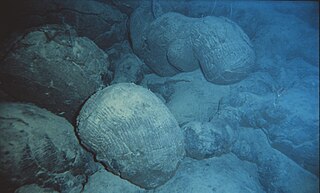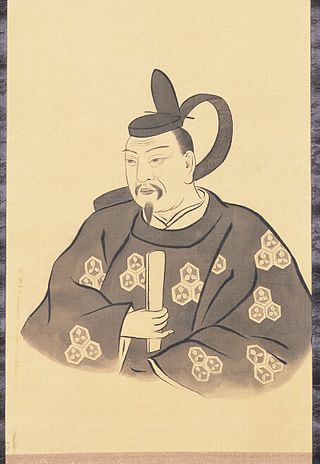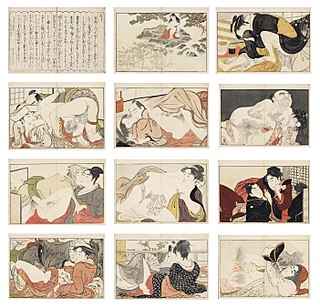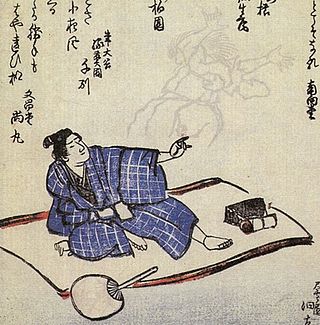
Pillow lavas are lavas that contain characteristic pillow-shaped structures that are attributed to the extrusion of the lava underwater, or subaqueous extrusion. Pillow lavas in volcanic rock are characterized by thick sequences of discontinuous pillow-shaped masses, commonly up to one meter in diameter. They form the upper part of Layer 2 of normal oceanic crust.

FLCL is an original video animation (OVA) anime series created and directed by Kazuya Tsurumaki, written by Yōji Enokido, and produced by the FLCL Production Committee, which consisted of Gainax, Production I.G, and King Records. FLCL is a story following Naota Nandaba, a twelve-year-old boy whose suburban life is disturbed by the arrival of the mysterious Haruko Haruhara. The six-episode series was released in Japan from April 2000 to March 2001 alongside a manga and novel adaptation.

The Pillows are a Japanese alternative rock band formed in 1989. The group has released 22 studio albums, several EPs and compilations, and over 40 singles. Outside Japan, they are best known as the group responsible for the soundtrack to the FLCL anime series.

Sei Shōnagon was a Japanese author, poet, and a court lady who served the Empress Teishi (Sadako) around the year 1000 during the middle Heian period. She is the author of The Pillow Book.

A pillow is a support of the body at rest for comfort, therapy, or decoration. Pillows are used in different variations by many species, including humans. Some types of pillows include throw pillows, body pillows, decorative pillows, and many more. Pillows that aid sleeping are a form of bedding that supports the head and neck. Other types of pillows are designed to support the body when lying down or sitting. There are also pillows that consider human body shape for increased comfort during sleep. Decorative pillows used on beds, couches or chairs are sometimes referred to as cushions.

The Battle of Fort Pillow, also known as the Fort Pillow massacre was fought on April 12, 1864, at Fort Pillow on the Mississippi River in Henning, Tennessee, during the American Civil War. The battle ended with Confederate soldiers commanded by Major General Nathan Bedford Forrest massacring U.S. Army soldiers attempting to surrender. Military historian David J. Eicher concluded: "Fort Pillow marked one of the bleakest, saddest events of American military history."

Please Mr. Lostman is an album released by the Pillows on January 22, 1997. The albums title is a play on "Please Mr. Postman" by the Marvelettes.

Thank You, My Twilight is an album released by The Pillows on October 23, 2002. The song "Biscuit Hammer" contains a reference to The Great Dictator, Charlie Chaplin's first film to employ spoken dialog. The titular song is featured in several episodes of FLCL Progressive and FLCL Alternative.

Turn Back is an EP released by The Pillows on June 23, 2004. It contains re-recordings of song originally published between 1990 and 1996 and was part of the band's 15th anniversary releases. The cover art is based on the folktale by the Brothers Grimm Town Musicians of Bremen.

Jacob's Pillow is a dance center, school and performance space located in Becket, Massachusetts, in the Berkshires. The facility itself was listed as a National Historic Landmark District in 2003.

Naoe Kanetsugu was a Japanese samurai of the 16th–17th centuries. The eldest son of Higuchi Kanetoyo, Kanetsugu was famed for his service to two generations of the Uesugi daimyōs. He was also known by his court title, Yamashiro no Kami (山城守) or his childhood name, Higuchi Kanetsugu.

Saiichi Maruya was a Japanese author and literary critic.

"White Summer and Green Bicycle, Red Hair with Black Guitar."[a] is a song and single by the Japanese, alternative rock band The Pillows. Neither the single nor Thank You, My Twilight were released outside Japan. The album was produced by Zin Yoshida of Salon Music.

Bihaku is a Japanese term coined in the 1990s with the emergence of skin whitening products and cosmetics.
Sun Chu was a native of Zhongdu commandery in Shanxi; who when quite young wished to become a recluse, and said to Wang Ji (王濟), "I will wash my mouth with rocks, and pillow my head on the running stream." "How will you manage that?" enquired Wang, smiling at his slip of the tongue. "Oh," replied Sun, not the least taken aback, "I will use the rocks for tooth powder, and the stream to cleanse my ears." He had passed his fortieth year before he entered upon an official career. Rising to high military command, he was received at an audience by the Emperor; but he absolutely refused to kneel, and would do no more than bow, alleging that a guardian of the Throne should never let himself be at a disadvantage.

My Pillow, Inc. is an American pillow-manufacturing company based in Chaska, Minnesota. The company was founded in 2009 by Mike Lindell, who invented and patented My Pillow, an open-cell, poly-foam pillow design. From 2004 to 2009, My Pillows were sold through Lindell's Night Moves Minnesota, LLC, and have been sold through My Pillow, Inc. since 2009. My Pillow has sold over 41 million pillows, due mostly to TV infomercials. The company started with five employees in 2004 and had 1,500 employees by 2017.
Mononoke are vengeful spirits (onryō), dead spirits (shiryō), live spirits (ikiryō), or spirits in Japanese classical literature and folk religion that were said to do things like possess individuals and make them suffer, cause disease, or even cause death. It is also a word sometimes used to refer to yōkai or henge.

Utamakura is the title of a 12-print illustrated book of sexually explicit shunga pictures, published in 1788. The print designs are attributed to the Japanese ukiyo-e artist Kitagawa Utamaro, and the book's publication to Tsutaya Jūzaburō.

Michael James Lindell, also known as the My Pillow Guy, is an American businessman, political activist, and conspiracy theorist. He is the founder and CEO of My Pillow, a pillow, bedding, and slipper manufacturing company.

The makuragaeshi is a kind of Japanese spirit or yōkai. They would come at night to one's pillow side and flip over the pillow. They are also considered to change which direction one's head or feet are facing. They are often found in many actual stories from the Edo Period to the modern period, and they are often said to appear as a small child or a bōzu, but there are no clear-cut accounts of how they look. In the Edo Period collection of yōkai pictures, the Gazu Hyakki Yagyō, they are depicted as a miniature Niō.


















